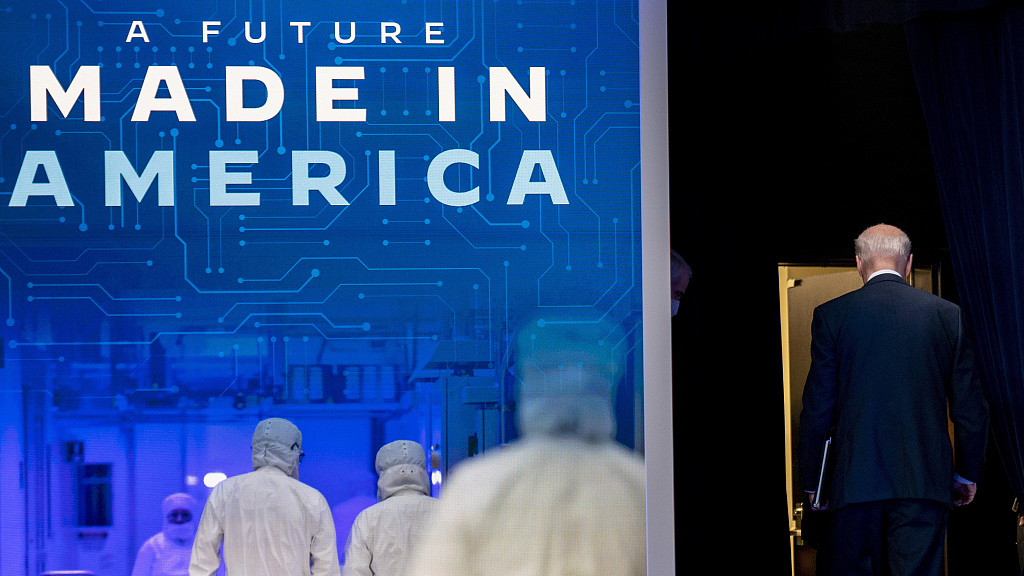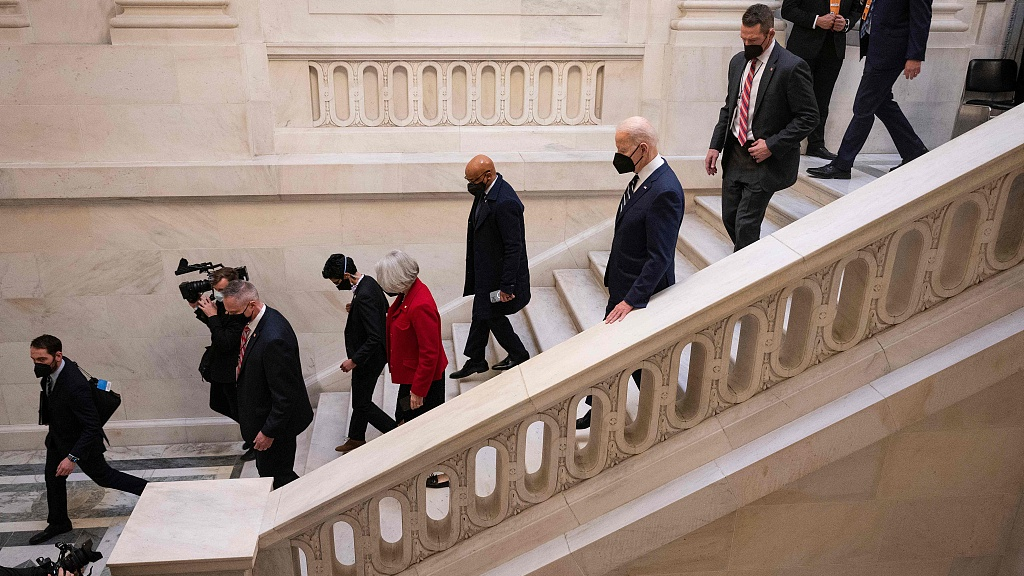
U.S. President Joe Biden leaves after speaking about Intel's announcement to about investing in an Ohio chipmaking facility, the White House, Washington,
D.C., January 21, 2022. /VCG
U.S. President Joe Biden leaves after speaking about Intel's announcement to about investing in an Ohio chipmaking facility, the White House, Washington,
D.C., January 21, 2022. /VCG
Editor's note: John Gong is a professor at the University of International Business and Economics and a research fellow at the Academy of China Open Economy Studies at UIBE. The article reflects the author's views and not necessarily those of CGTN.
Industrial policy and state subsidy lie at the center of America's accusation of China's alleged mercantilist and predatory economic behaviors, in what is described as the state-steered national capitalism model. For example, about half of the pages in the former U.S. Trade Representative (USTR) Robert Lighthizer's Section 301 report against China are related to these.
"China is an outlier when it comes to global norms and rules governing trade, investment, and economic policy, and that the unremitting and even accelerating 'innovation mercantilist' behavior on the part of the Chinese government represents a threat not only to the U.S. economy, particularly its advanced industries, but indeed to the entire global economic and trade system," read the opening statement of an ITIF (Information Technology and Innovation Foundation) report as early as 2017. ITIF is an influential Washington D.C. based think tank that provided the bulk of the theoretical and spiritual inspirations for former U.S. President Donald Trump's trade war with China.
But now Washington is about to do exactly what it accused China of doing, do it with broad political consensus with both aisles of the Congress firmly behind it, and do it on a scale that dwarfs what the Chinese government had done so far. The House next week is expected to consider the America Competes Act, a $250 billion bill as a means to strengthen U.S. technology, manufacturing and research. The Senate already passed a similar bill last year for more or less the same amount.
Among other things in the bill, there is the $52 billion federal subsidy directly at the construction of factories to produce semiconductor chips. Now this is the federal money on top of the state provided incentives, for example, in Arizona also involving tens of billions of dollars, where Intel has committed to building new semiconductor factories.

U.S. President Joe Biden walks down the stairs at the Russell Senate Office Building after a meeting with the Senate Democratic Caucus in Washington, D.C., January 13, 2022. /VCG
U.S. President Joe Biden walks down the stairs at the Russell Senate Office Building after a meeting with the Senate Democratic Caucus in Washington, D.C., January 13, 2022. /VCG
The House version of the bill also includes $45 billion in loans and grants to support domestic manufacturing of critical goods, and $600 million in particular to support manufacturing of solar panels. The bill also provides special access to green cards, which enable permanent resident status, for entrepreneurs and scholars with degrees in STEM (science, technology, engineering and mathematics) fields.
Now if this is not industrial policy and state subsidy, I don't know what else could it be.
It is ironic but also amusing to see that Washington appears to be unabashedly copycatting Beijing, other than it is doing it probably even on a much larger scale, while at the same time accusing the latter of breaking global norms and rules. But the truth of the matter is industrial policy and state subsidies are something that Washington has always been doing, albeit not as ostensibly as now, for example in projects in the Defense Advanced Research Projects Agency (DARPA) program, in the National Institute of Health program, and others. Today Washington is not just funding research and development, but it is also funding manufacturing directly, and it does so in a legislative manner.
Even setting aside the issue of whether the two new bills in Congress qualify as mercantilist and predatory practices, it is indeed a legitimate question to ask regarding whether this legislative initiative would constitute violations of the Agreement on Subsidies and Countervailing Measures at the WTO.
My view is that there is no clear-cut answer to this complicated question, but this is precisely the kind of issue that needs to be worked out in the WTO reform, and also bilaterally in trade talks between Beijing and Washington. For now at the very least, Washington should just stop the admonishing rhetoric against China about something it is also doing.
(If you want to contribute and have specific expertise, contact us at opinions@cgtn.com.)

